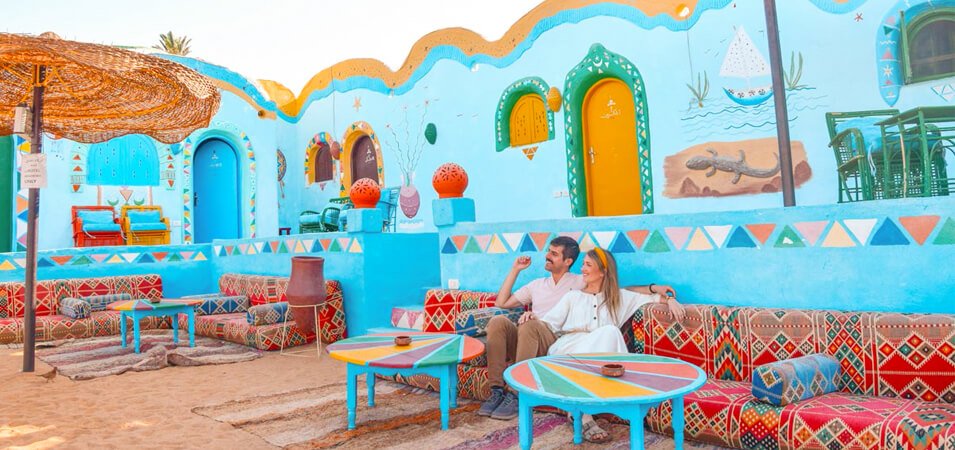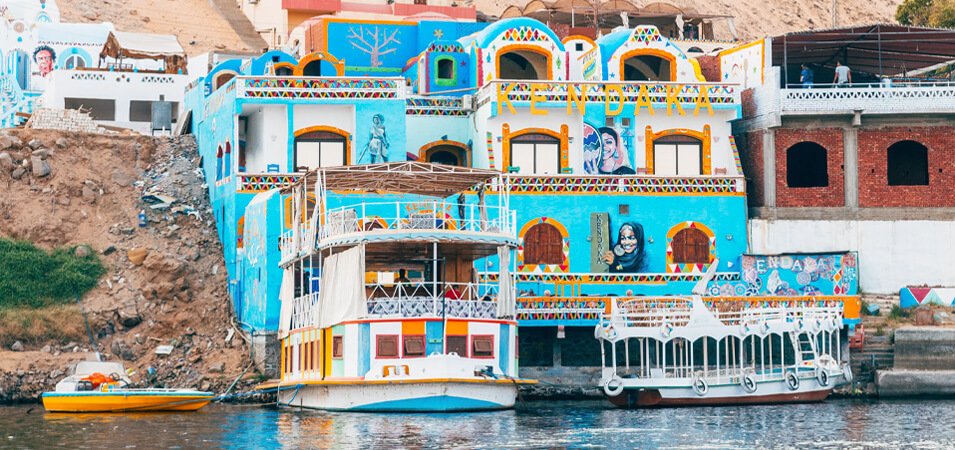Nestled along the banks of the mighty Nile River, the Nubian Village in Aswan offers visitors an extraordinary opportunity to experience the vibrant culture, traditions, and history of the Nubian people. Located on the western bank of the Nile, just south of Aswan, this village remains a hidden gem, where ancient customs continue to thrive in the face of modernization.
Visitors to this picturesque village are treated to not just stunning views of the river and surrounding desert, but also a deeper connection to a civilization that has endured for thousands of years. From its unique architecture and colorful homes to the warm hospitality of the Nubian people, the village provides a one-of-a-kind experience that captures the essence of Nubian culture.
Why Visit Nubian Village in Aswan?
Nubian Village is an exceptional destination for travelers seeking more than the typical Egyptian experience. The village offers a glimpse into a lifestyle that has remained distinct and separate from mainstream Egyptian culture for centuries. With a rich history dating back to the time of the Pharaohs, the Nubian people have maintained a unique identity shaped by their environment, traditions, and experiences.
Here’s why Nubian Village should be on your travel list:
- Rich Cultural Heritage: Discover the deep cultural roots of the Nubian people, whose customs, language, and way of life are vastly different from those of other Egyptian communities.
- Scenic Riverside Location: The village sits on the serene western banks of the Nile, offering visitors breathtaking views of the river, surrounding greenery, and desert landscapes. The calm atmosphere makes it an ideal place for relaxation and cultural immersion.
- Warm Nubian Hospitality: Known for their generosity and warmth, the Nubian people are eager to share their heritage with visitors. Expect to be welcomed with open arms and invited into homes to experience the local way of life.
Location and Access: How to Reach Nubian Village
The Nubian Village is situated just south of Aswan, along the Nile’s western bank. Its location is both accessible and secluded, offering an authentic experience away from the typical tourist crowds.

How to Get to Nubian Village?
There are several ways to reach the village, each offering a different way to appreciate the beauty of the landscape:
- Boat Rides Along the Nile: The most popular and scenic way to reach the village is by boat. A short boat ride from Aswan will allow you to take in stunning views of the Nile, with its sparkling waters and lush greenery, all framed by the arid desert landscape. This peaceful journey will set the tone for the tranquil experience awaiting you in the village.
- Traditional Felucca Experience: For a more traditional and romantic experience, you can opt to sail on a felucca—a wooden sailboat that has been used by Egyptians for centuries. This mode of transportation offers a slower pace, allowing you to connect with the river in the same way the ancient Nubians once did.
- Other Transport Options from Aswan: If you’re looking for a faster route, the village can also be reached by a short 30-minute drive from Aswan. Alternatively, many tour packages include transportation to and from the village, allowing you to enjoy a guided exploration of the area.
Unveiling the Historical Significance of Nubian Village
Nubian civilization is one of the oldest in Africa, with a history that stretches back thousands of years. Known for its wealth in gold and strategic location along key trade routes, Nubia was once a powerful kingdom that influenced the development of Egypt and other ancient civilizations.
Nubian Civilization: A Glimpse into the Past
In ancient times, Nubia was a region rich in natural resources, especially gold, and its people played an essential role in Egypt’s history. The Kingdom of Nubia was once so powerful that its rulers, known as the “Kushites,” even conquered Egypt at one point, with several Nubian pharaohs ruling over Egypt during the 25th Dynasty. The Nubians were skilled builders, craftsmen, and traders, and their influence is evident in many of Egypt’s monuments, temples, and artifacts.
Nubian Village: Preserving Identity and Tradition
The construction of the Aswan High Dam in the 1960s forced many Nubians to relocate from their original homeland to the villages surrounding Aswan. Despite the displacement, the Nubian people have worked hard to preserve their cultural identity, keeping their language, customs, and traditions alive in the face of modern challenges. The Nubian Village in Aswan is a testament to their resilience and pride in their heritage.
Unique Nubian Architecture and Symbolism
One of the most distinctive features of Nubian culture is the unique architecture of the village homes. The vibrant and colorful houses are an iconic part of the Nubian aesthetic, and their design is deeply intertwined with the community’s way of life.
Traditional Nubian Houses
- Colorful Homes: The houses in the Nubian Village are easily recognizable by their bright, vibrant colors. Walls are often painted in shades of blue, yellow, green, and red, which create a warm and welcoming atmosphere. These colors are not just decorative; they carry symbolic meaning, with each hue representing different aspects of Nubian life and beliefs.
- Climate-Adapted Designs: The architecture is designed to cope with the harsh desert climate. Nubian houses have thick, insulated walls that keep the interiors cool during the scorching summer heat. The homes are typically made of mudbrick or stone, materials that provide natural insulation and protect residents from extreme temperatures.
- Meaningful Designs: The walls of Nubian homes are often adorned with geometric patterns, animal motifs, and symbols that carry cultural significance. These designs are believed to offer protection, good fortune, and harmony. Some motifs are specific to the family or community, serving as a form of visual identity and connection to Nubian traditions.
Exploring Nubian Culture and Traditions
The Nubian people are known for their rich cultural expressions, including music, dance, art, and crafts. The village provides visitors with a chance to explore these traditions up close.
The Role of Music and Dance
- Traditional Instruments: Music plays a central role in Nubian life, and the village is full of rhythms that echo the past. Instruments like the tambourine and tar drum are common at celebrations, particularly during weddings and festivals. The music is lively and deeply expressive, reflecting the joy and unity of Nubian culture.
- Communal Dances: Nubian dance is an important social activity, often performed during village celebrations and festivals. The dances are characterized by intricate footwork, energetic movements, and a sense of communal joy that binds the community together.
Nubian Dress and Jewelry: A Cultural Statement
Traditional Nubian attire is not only visually stunning but also deeply symbolic. The colorful fabrics, jewelry, and accessories worn by the Nubian people often carry cultural and familial significance. Jewelry, in particular, is often passed down through generations and holds personal meaning for the wearer.
Nubian Language: A Living Legacy
The Nubian language is one of the most important elements of the community’s identity. Despite the influence of Arabic and the spread of other languages in Egypt, the Nubian language is still spoken by many residents in the village. Efforts are being made to preserve the language and pass it on to future generations, ensuring that Nubian culture remains alive and well.
Daily Life and Traditional Occupations in Nubian Village
Agriculture, craftsmanship, and trade are central to the economy and daily life of the Nubian people. The fertile banks of the Nile provide an ideal setting for farming, and traditional crafts continue to thrive.
Farming and Livelihood
Agriculture is vital to the survival of the Nubian community, with crops such as dates, wheat, and vegetables being grown along the Nile’s banks. The village is also known for its fishing, which is a traditional practice that has been passed down through the generations.
Artisanal Crafts and Souvenirs
Nubian artisans are known for their skillful pottery, jewelry, and textiles. These crafts are not just products for sale but are an expression of Nubian culture and pride. Visitors to the village can purchase handmade goods directly from the artisans, supporting local craftsmanship and preserving the community’s artistic traditions.
Savoring Nubian Cuisine: A Taste of Tradition
Nubian cuisine is a delightful blend of local ingredients and traditional recipes that reflect the agricultural practices of the region. Visitors to the village can enjoy a variety of dishes, many of which are cooked using ancient techniques passed down through generations.
- Fatta: A hearty dish made from rice, bread, and meat, typically flavored with garlic, vinegar, and a blend of spices.
- Tamiya (Nubian-style falafel): A twist on the classic Egyptian falafel, made from fava beans and seasoned with local spices, providing a unique taste of Nubian cuisine.
These dishes, along with many others, can be enjoyed in local eateries or even in the homes of Nubian families, where visitors are often invited to share in the meal and learn about the food culture.
The Nile: Lifeblood of Nubian Civilization
The Nile River has been central to Nubian life for thousands of years, providing water, transportation, and sustenance. The river’s waters nourish the land, support agriculture, and enable trade and transport. The connection between the Nubian people and the Nile is sacred, and sustainable practices are employed to ensure the river continues to provide for future generations.

Warm Nubian Hospitality: A Truly Authentic Experience
One of the most memorable aspects of visiting the Nubian Village is the hospitality of the people. Visitors are often welcomed into homes, offered tea, and invited to listen to stories about the village’s history and traditions. The community’s warm and generous spirit makes it easy to feel at home, and the close-knit nature of the village ensures that visitors will never feel like outsiders.
FAQs
What is the best time to visit Nubian Village?
The ideal time to visit is from October to April, when the weather is cooler and more comfortable for exploring.
Is Nubian Village safe for tourists?
Yes, the village is safe and welcoming. Visitors are encouraged to respect local customs, including dressing modestly and asking for permission before taking photos, especially of women.
Can you stay overnight in the village?
Yes, there are several guesthouses and homestays where visitors can experience the full range of Nubian hospitality.
How much time should you spend in the village?
A half-day tour is enough to see the main sights, but a full day or overnight stay will allow for deeper immersion in the local culture.
